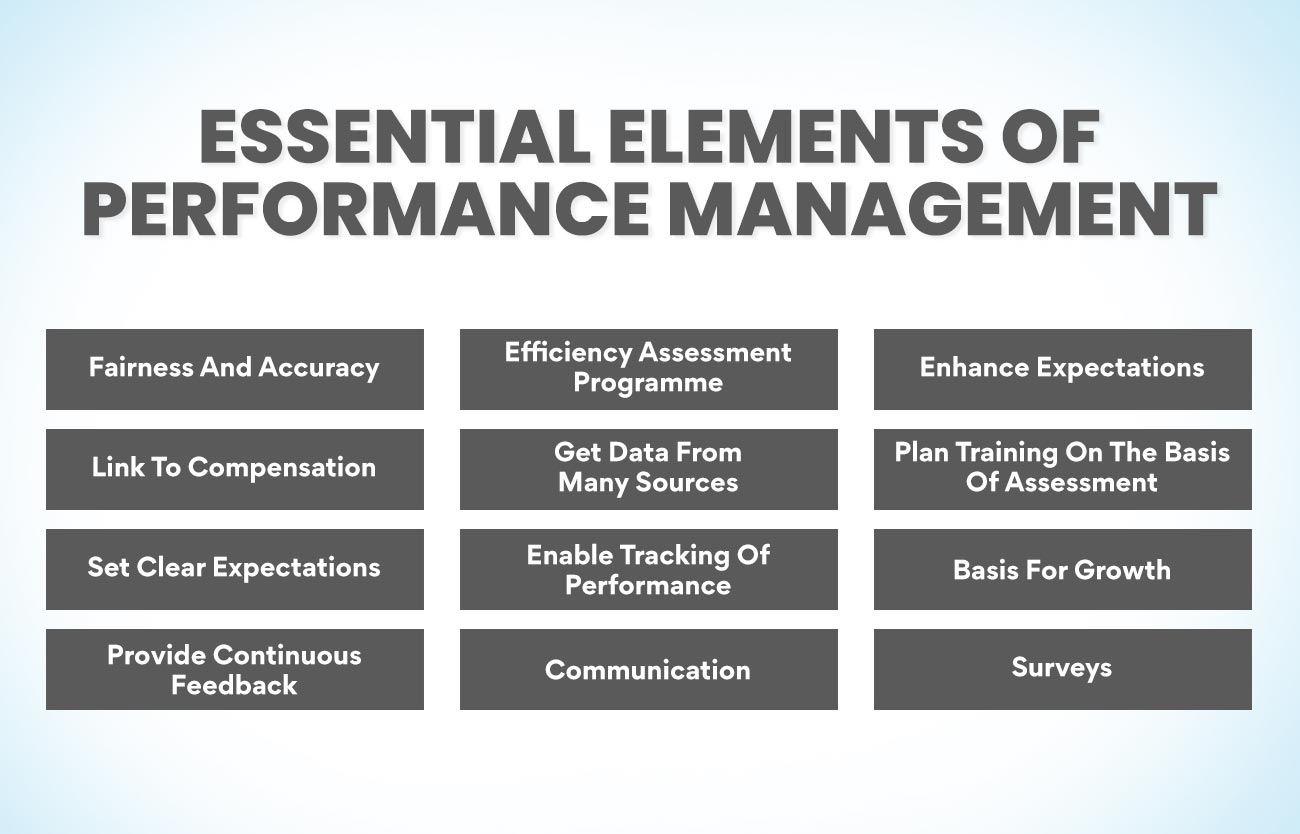Every organisation has an objective, and the top management wants to achieve it within its set timeline. However, it is in the hands of more than the executives to achieve the company’s goals. The staff members must work towards the achievement of the common goal. If they perform as desired by the firm, the company can achieve its goals. But how can one know if the staff members are doing what the firm expects them to do and whether they need support to achieve their goals? It is where we find the importance of performance management.
You can learn everything about performance management in the Executive Development Programme In General Management offered by reputed institutions. More details about this course are available on our website.
What Is Performance Management?
Companies need their employees to perform to the best of their capabilities. Only this will help the firm achieve its goals. But not all employees regularly do their best. There can be various reasons for their not performing as desired. It can be understood only if the organisation monitors their performance. The tools used by the company to evaluate employees’ work are called performance management. This activity aims to ensure people work most efficiently and to know why someone is not working as well as they should.
Performance management aims to help employees know how well they are working and improve wherever there is an opportunity. The tool also helps the company create an environment that will help staff members to use all their potential. This method also enables the team leaders to convey their expectations from the team members very clearly and without any ambiguity. The importance of performance management is that it allows the company to view each employee in the context of a broader office system. Workers and the management benefit from this activity.
Read More: Understanding Talent Management And Its Importance
Understanding The Importance Of Performance Management
Performance management is important for both the company and its employees. It also shows how an individual’s performance aligns with the organisation’s goals. Though it is practically unattainable, companies seek the absolute performance standard through this activity. The importance of performance management lies in the fact that both sides understand what will be achieved and how it will affect the company’s progress.
Performance management programmes follow the traditional methods of setting goals and milestones. They also define what good work is and how a person’s work can be assessed. However, unlike the old system of assessing an employee once a year, performance management programmes treat every interaction with the employee as a chance to learn. Managers use these tools to adjust expectations and change workflow to help employees achieve their goals. The importance of performance management is that it allows managers to clearly state what they expect from their employees and tell them when they are not working as expected.
The Aim Of Performance Management Programmes
Aligning Company Goals With Employee Activities – Performance management programmes help align employee activities with corporate goals. It also conveys to the staff members the impact of their work on the performance of the company and its achievement of objectives.
Developing Performance Outcomes – Performance management programmes clearly state the outcome of each employee’s actions. Through this programme, the company explains the process each employee must follow. It also explains the effect of individual performance on the company. This programme also outlines how employees must interact with clients, colleagues and supervisors.
Creating Measurable Performance Standards – Employees give inputs about measuring success. Expectations should include results, actions and behaviour of the employee.
Define Duties – Another importance of performance management is that it enables companies to define the duties of each worker. Team managers and members should sit together and list the tasks they expect each person to complete. Employees state what new things they want to learn and how they will use their knowledge to benefit the firm.
Regular Assessment – One of the main aims of performance management is to have regular assessments instead only once a year. It helps to make every event an opportunity to evaluate the employee’s performance and help them achieve their goals.
Stages In Performance Management
Planning
In this stage, the company must set goals for the employees and ensure that this is communicated to them. In most cases, the objectives are conveyed to the employees as part of the job description. But it makes sense to convey this to them again after they have been hired. It will serve as a reminder about what the company expects from them. The importance of performance management is that it helps clearly define the company’s expectations from each employee.
Monitoring
It is the stage where continuous performance assessment happens. Team heads are tasked with monitoring the performance of their employees and comparing it with their goals. Various software programmes help managers track the work of their subordinates continuously. It allows them to correct those who deviate from their objectives.
Developing
Employee development and growth is an important activity in every company. It helps the staff members know that the company is interested in their growth. Based on the results from the monitoring stage, managers can suggest corrective steps to improve individual performance. It also helps them create training programmes for those who lack the skills to complete their tasks successfully. Enabling employee development is another importance of performance management.
Rating
Once the assessment is done, each employee must be rated for their performance. This must happen periodically and at the time of the annual appraisal. Ratings help the company understand the standing of each employee with regard to their performance. The organisation can then take corrective steps if necessary. Companies can also collect ratings from peers to understand how the worker behaves as a team member.
Rewarding
All employees need rewards and recognition. It is the motivation for them to perform better in future. Such rewarding systems also help the company retain good employees. It is also an important part of employee engagement. Rewarding a staff member can happen as a mention in the internal network, social recognition or as a total rewards programme for all employees.
You can understand the complete performance management life cycle in the Executive Development Programme In General Management. More details about this course and how it will help you are available on our website.
Essential Elements Of Performance Management

- Fairness And Accuracy
There is always a complaint from the employees that assessments are biased. To avoid this, the performance management programme should have high accuracy. The company can achieve this by viewing the employee from different perspectives. It is not enough to only consider the achievement of goals. The assessor must also consider the employee’s skills, capability and job context. One of the importance of performance management is that it can accurately assess employees and reward them correctly.
- Efficiency Assessment Programme
Any performance management programme that takes too much time is not worth implementing. Taking too much time can discourage employees from participating in it. Managers can also end up spending too much time on the programme that they don’t do the assessment properly. The performance management system must be efficient and easy to execute. It must be continuous and simple so that the employee doesn’t have to deviate from his regular work to perform the assessment.
- Enhance Expectations
When the company prepares the evaluation parameters, it must ensure that the highest potential of the employees is considered. There is no point in having minimum expectations from your staff members. It will keep them performing at a mediocre level and will not lead them to growth. Having a higher level of expectation will motivate them to push themselves to reach their maximum potential. The importance of performance management lies in encouraging employees to prove their capabilities.
- Link To Compensation
The performance evaluation must ultimately be linked to the compensation given to the employee. It is one way to decide the salary hike for employees. Most companies base their compensation packages on performance reviews. This allows performing employees to earn more and motivate others to improve their work. Care must be taken to do the assessment accurately, failing which employees will suffer for no fault of theirs. However, salary hikes should not be the only aim of performance management.
- Get Data From Many Sources
It is very common to see managers having a bias. It can result in inaccurate assessments. Employees will suffer just because they are not the manager’s favourite. To avoid this, the evaluation method must get data from many sources. You can take information from their colleagues. It is also possible to get data from outside entities that the employee is in regular contact with. The importance of performance management systems is that they allow for an accurate and fair assessment of employees.
Read More: What Are General Management Courses?
- Plan Training On The Basis Of Assessment
One of the actions following the assessment of employees should be to provide the training necessary for each one of them. Performance management should result in devising training programmes that will help workers achieve a higher level of success in their careers. Once the evaluation is done, the company must see where a staff member is deficient and make arrangements to equip the person with the necessary skills. Such an action will make workers feel that the company is interested in their individual growth.
- Set Clear Expectations
The contribution from employees must help the company achieve its goals. It is essential for managers to lay down the expectations from the employees very clearly. Employees must be clear about what they must achieve and how their contribution impacts the company’s performance. It will result in better performance from them and ensure the achievement of organisational goals. The importance of performance management lies in setting specific goals and the time frame within which employees must achieve them.
- Enable Tracking Of Performance
It is not enough for the managers or HR officials to monitor the working of the employees. They must also be able to track their functioning. It will help them know where they stand and what improvements they must bring about in their work. It is also a method to make them understand why they are not able to achieve what is expected from them. Self-tracking of performance makes them aware of their shortcomings and makes them more willing to get trained in the necessary skills.
- Basis For Growth
No employee wants to remain in the same position for long. Everyone is looking at advancement in their careers. Finding out employees’ capabilities and helping them grow is one of the importance of performance management. It helps the company know what skills a worker needs to acquire to move into the next position. The organisation can arrange for necessary training and equip the workers with more skills. It is an excellent way to retain good employees and give them a chance to grow.
- Provide Continuous Feedback
The performance management system that you implement must be able to continuously assess each employee. It will help the managers provide the necessary feedback to the workers. It also gives them an opportunity to give real-time information to staff members about where they are deviating and how they can get back on track. Having continuous evaluation also helps managers to arrange for resources that will help the workers achieve their goals. Managers can also appraise the top management about employee performance whenever there is a meeting between the two.
- Communication
Communication is an essential element of this system. The importance of performance management lies in the ability for continuous assessment and correction. There must be open communication between managers and their team members. It allows both sides to discuss goals and whether there are any difficulties in achieving them. Employees get an opportunity to voice their requests for additional coaching or other resources. Having regular communication helps the manager understand the coaching requirements of the team members.
- Surveys
Employee surveys must be a part of performance management. Such surveys help the management gain valuable insights into what is happening in the company. It will help them know about employee concerns and difficulties in reaching their goals. Surveys also enable managers to know the level of employee engagement in the programme that will have a direct impact on the output. Such surveys also help the management see the areas that need improvement.
Benefits Of Having A Performance Management System
Better Employee Retention
One of the importance of performance management is that there is continuous assessment of the workers and regular feedback provided to them. Such regular feedback from the managers improves the morale of the employees. Managers can know where the employees are falling short. They can give immediate information to the workers and help them improve their work and achieve goals on time.
Identify Training Needs Immediately
Keeping updated with the latest technology is very important for companies to grow and develop. Employees of the firm must be familiar with the latest tools that help to make work more efficient and easy. They must possess the latest skills that help them work more efficiently and improve the company’s performance. The importance of performance management is felt in the timely identification of training needs. The company can devise training programmes and ensure that their employees are updated with the latest skills.
Helps Employees Define Career Path
Employees remain in a company only if they know that there are growth prospects. They must be able to move forward in their careers and go to higher positions. One of the main reasons for people moving out of a company is that they don’t see any progress in their careers. The performance management system helps employees know their expertise and what career path will be ideal for them. As the system involves all employees and managers, there is more likelihood of the latter providing equal opportunity for all to grow and develop.
Improves Self Motivation
Micromanagement doesn’t always work. Most employees don’t like to be supervised in every activity that they perform. The importance of performance management can be known when employees are self-motivated. It is because they get regular feedback about their work. They will improve their weak areas and make sure that they achieve their goals. This avoids micromanagement and helps managers attend to more important work.
The Executive Development Programme In General Management deals extensively with performance management systems. You can learn more about this course on our website.
Conclusion
Companies achieve their business and financial objectives only if the employees reach their expected performance levels. Employees can also advance in their careers only if they know their shortcomings and their potential. Performance management systems help both the organisation and its workers reach their objectives. It continuously monitors the performance of employees and gives them feedback. Such information helps them improve their working methods and reach their goals. This, in turn, helps the company also achieve its objectives. A performance management system provides support for the growth of the firm and its staff.
More Information:
On Which Basis The Salary of General Manager Is Allocated
Talent Management: Models and Key Fundamentals
What is Managerial Economics? Meaning, Fundamentals & Frameworks



























